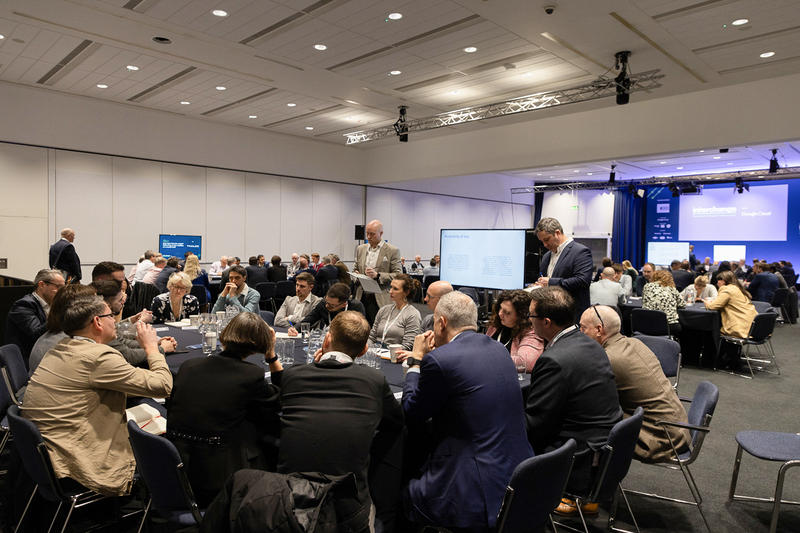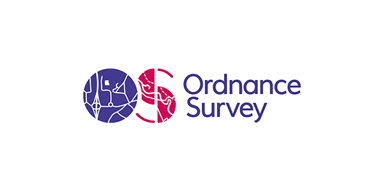Interchange 2024: Ordnance Survey’s voice in transforming the transport sector
Encouraging open collaboration and innovation
The transport sector is a vital part of society and day-to-day life, interconnecting consumers, businesses, governments in the movement of goods, people, and culture.
At the end of February 2024, professionals and experts in the transport sector attended the Interchange Conference and roundtable. We participated in Interchange’s discussions as we share the same ideals: interconnecting all transport modes, create a better performing ecosystem, and champion sustainable and interoperable transport.
OS already plays a vital role in underpinning the transport sector with trusted geospatial data, but we need more partners, collaborators, and industry experts to share their input, and help break down barriers, particularly in the use of location data. The roundtable presented the ideal opportunity to help bring key stakeholders together, and discuss the challenges of connected location intelligence that need to be unlocked to improve
In attendance were representatives from the railway sector, airports, governmental bodies, roads authorities, consultants, research groups, tech industry experts, professional services, and colleagues from Ordnance Survey. Ahead of the meeting, OS’s representatives devised a brief survey, presenting eight subtopics so that everyone could vote based on their importance. Those chosen were:
- Organisations’ willingness to share their data,
- the accessibility of data, and
- the interoperability of data.
In the spirit of open collaboration within the transport sector, like to share a summary of the group’s valuable insights.
Willingness to share
Data integration and collaboration can unlock new levels of insight and analysis – more than would have been possible by organisations working alone. However, organisations can be understandably hesitant when it comes to sharing their data. Concerns can include competitiveness, privacy, and liability.
Which is why, when collaborating on a group project, there should a clear use case on what kind(s) of data are needed, what can be done with it, and what can be gained with it. A point was raised to find the mutual value, which was strongly echoed amongst the group. Not necessarily the commercial value; mutual value could be shared financially, but also via other benefits, such as improving operations, efficiencies in business processes, or even consumer experience.
Accessibility of data
But, before data sharing can happen, the roundtable moved onto the quality of the data in question. Key players in the transport sector may either not be collecting relevant and important data; or gathering more raw data than they need. Vast amounts of data are already available to the transport sector, but quantity does not guarantee quality. You wouldn’t read every book in a library for one specific request.
“Every organisation needs to understand their data, and realise that they put out information, not data.”
Instead, what is needed is insight. Definitions. Specifications. Objectives. Something needs to be derived from data before it can be used and shared. The roundtable agreed that an organisation needs to better understand what data it has, what makes its data valuable, and what they can do with it – to help build trust, and define specific use cases. Once that value is defined, we can discern what data is useable, what needs to be shared, and inform decisions towards a fair value exchange.
In short, data should be treated like a physical asset, in the same way a train or a plane is an asset. Much like an organisation’s range of assets, they can’t all be used in the same way.
Interoperability
Data interoperability had, appropriately, already been mentioned within the group’s previous topics. There can be difficulties and effort involved with data interoperability, which may impact willingness to share; and the quality of data accessibility can result in penalties, if standards aren’t maintained.
Data interoperability remains a significant challenge to the transport industry, indeed to all sectors; the difficulty of getting disparate datasets to harmonise. Each organisation uses different systems, different data capture methods, different data models – as an example, we’ve seen multiple variations of an address for one single location, creating numerous difficulties such as delivering last mile services.
However, these challenges are not insurmountable. NUAR, the map of underground assets, is an example of what is possible. It required a combined effort, with parties involved that were sensitive of their data. But, with the right know-how and expertise, the development of a data model, the sharing and integration of separate datasets, the consortium delivered a solution to help improve the efficiency of the utilities sector, reduce disruption, and is envisaged to deliver significant economic growth.
With the right experts involved, much like those gathered at Interchange, we believe this can be, and should be replicated for the transport industry.

Join the discussions
At OS, we believe we can push the transport sector forwards, much like we did the utilities sector with our contributions to NUAR. We know that location data has a demonstrable history of providing a platform upon which solutions can be built, where data can be shared, integrated, made accessible. In collaborative projects, it starts with a map, and builds from there.
We understand and appreciate why agencies may be hesitant in sharing their data; the discussions raised at the roundtable are testament to that. But keeping these data loops closed will limit the potential of solutions, and even decrease innovation.
More discussions are needed, more decisions need to be made. That’s why we’d like to attend more roundtables like these. We feel the need for a follow-up; the simple fact that we had eight viable topics and ran out of time to fully explore just three of them proves that there’s more to be said.
If you or your organisation would like to an express an interest, and become a part of this ongoing conversation, please reach out to bradley.taylor@os.uk.

Our highly accurate geospatial data and printed maps help individuals, governments and companies to understand the world, both in Britain and overseas.